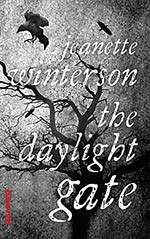
![]() Rhondak101
Rhondak101
9/23/2014
![]()
The circumstances for the publication of The Daylight Gate, a book about the 1612 Pendle (Lancashire) Witch Trials are interesting. First, it was published in 2012, during the 400th anniversary of the Pendle Trials. At the same time there was a proliferation of works and events commemorating the event, including a children's book, poems, a television documentary, two plays, and a statue of Agnes Nutter, one of the witches executed. Second, Hammer Publishing (yes, that Hammer) commissioned Jeanette Winterson to write a horror novella for its new imprint. Jeanette Winterson, OBE, winner of numerous literary awards, and best known for novels such as Sexing the Cherry and Oranges Are Not the Only Fruit, does not immediately seem a likely candidate for this task. Yet, Winterson set this novella during these 1612 Witch Trials and mined the local history to present the trials through a modern perspective.
As scholars of European witch trials know, sexuality, class, and religious and political preferences drove the accusations of witchcraft. And, an accusation was often all that was needed, as the tests administered to prove the accused's innocence usually resulted in his or her death. Someone as politically and historically astute as Winterson could not approach this event without demonstrating the ways that witch trials were manipulated by everyone--commoners, the wealthy, religious and political figures—anyone who wanted to eliminate an enemy by a false accusation. However, she offers plenty of supernatural elements that show that there were witches tried in the Pendle Witch Trials, but the reasons behind their accusations are based on real world issues of property and class, rather than supernatural threats. She demonstrates the differences in the treatment when a poor woman, the Demdike, was accused and when a rich one, Agnes Nutter, was accused. Yet the result is always the same—a horrible death for the accused.
In her Introduction, Winterson points out the places where she uses her authorial imagination to connect Lancaster to some of the age's most famous figures, such as William Shakespeare and John Dee. This historical license and Winterson's spare, yet lyrical, prose give this novella a postmodern voice.
The characters of Agnes Nutter, the Demdike, and their accuser Thomas Potts are well drawn and developed even thought the book is only 200 pages (or maybe even less). After reading The Daylight Gate, I wanted to read more about the witch trials in England and Scotland.